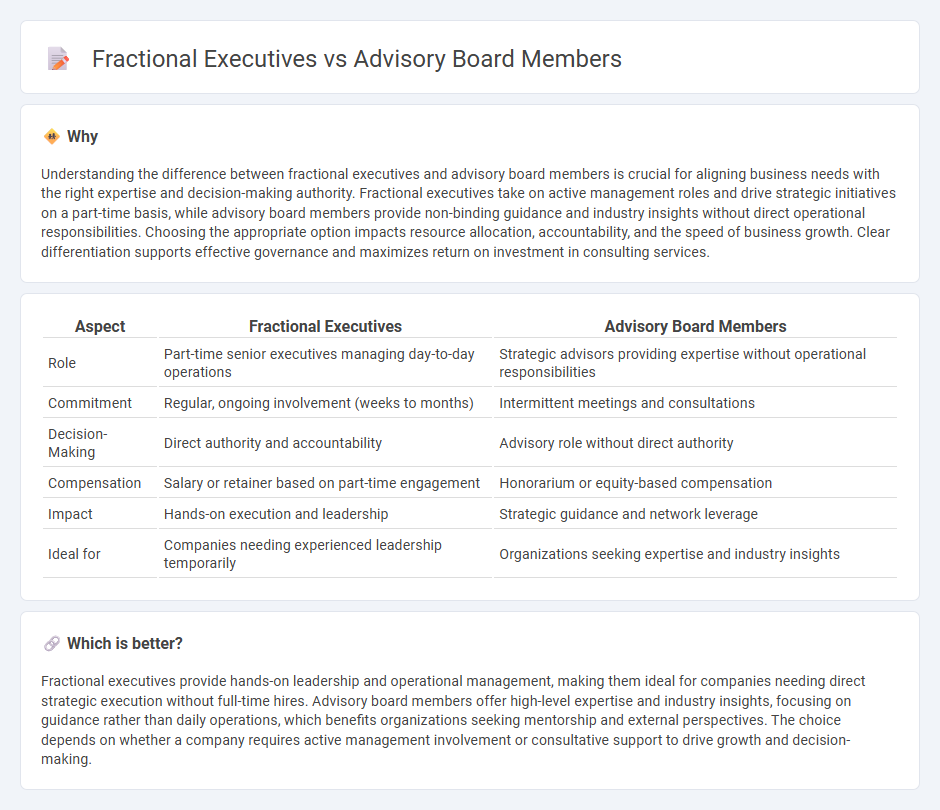
Fractional executives provide part-time, hands-on leadership tailored to specific business needs, driving operational improvements and strategic execution. Advisory board members offer expert guidance and strategic insights without direct management responsibilities, enhancing decision-making through their diverse experience. Discover more about how these roles can uniquely benefit your organization's growth and leadership dynamics.
Why it is important
Understanding the difference between fractional executives and advisory board members is crucial for aligning business needs with the right expertise and decision-making authority. Fractional executives take on active management roles and drive strategic initiatives on a part-time basis, while advisory board members provide non-binding guidance and industry insights without direct operational responsibilities. Choosing the appropriate option impacts resource allocation, accountability, and the speed of business growth. Clear differentiation supports effective governance and maximizes return on investment in consulting services.
Comparison Table
| Aspect | Fractional Executives | Advisory Board Members |
|---|---|---|
| Role | Part-time senior executives managing day-to-day operations | Strategic advisors providing expertise without operational responsibilities |
| Commitment | Regular, ongoing involvement (weeks to months) | Intermittent meetings and consultations |
| Decision-Making | Direct authority and accountability | Advisory role without direct authority |
| Compensation | Salary or retainer based on part-time engagement | Honorarium or equity-based compensation |
| Impact | Hands-on execution and leadership | Strategic guidance and network leverage |
| Ideal for | Companies needing experienced leadership temporarily | Organizations seeking expertise and industry insights |
Which is better?
Fractional executives provide hands-on leadership and operational management, making them ideal for companies needing direct strategic execution without full-time hires. Advisory board members offer high-level expertise and industry insights, focusing on guidance rather than daily operations, which benefits organizations seeking mentorship and external perspectives. The choice depends on whether a company requires active management involvement or consultative support to drive growth and decision-making.
Connection
Fractional executives and advisory board members both provide strategic guidance without full-time commitment, enhancing organizational agility and expertise. Fractional executives typically engage in hands-on leadership roles on a part-time basis, while advisory board members offer high-level advice and industry insights to inform decision-making. Their connection lies in leveraging specialized knowledge to drive business growth and innovation efficiently.
Key Terms
Governance
Advisory board members provide strategic guidance without direct management responsibilities, enhancing corporate governance through expertise and oversight. Fractional executives actively manage day-to-day operations part-time, ensuring governance policies are implemented effectively within the organization. Explore how each role strengthens governance frameworks to optimize business leadership and decision-making.
Operational Leadership
Advisory board members provide strategic guidance without daily operational involvement, offering expertise and credibility to support high-level decision-making. Fractional executives take on active leadership roles within operations, managing teams and driving execution while working part-time or on a contract basis. Explore how choosing between these roles can impact your company's operational leadership effectiveness.
Strategic Guidance
Advisory board members provide high-level strategic guidance without direct management responsibilities, offering industry expertise and networking opportunities to bolster company growth. Fractional executives actively lead specific functions with hands-on management, implementing strategies and driving operational execution on a part-time basis. Discover how to leverage both roles effectively to enhance your business strategy.
Source and External Links
Board of Advisors: Functions, Benefits & Selecting Members - Advisory board members are typically volunteer experts invited to assist the board of directors by providing knowledge and resources without voting rights, selected for their expertise to fill knowledge gaps and aid in reaching organizational goals.
What Are Advisory Board Roles and Responsibilities? - Advisory board members serve as subject matter experts who provide strategic guidance, mentorship, networking opportunities, and advocacy to help guide company leadership and align decisions with long-term organizational goals.
Difference Between Advisory Boards & Board of Directors - Advisory board members are often external professionals selected for their specialist knowledge or expertise to advise on business challenges and strategy but do not have decision-making powers or fiduciary responsibilities like directors do.
 dowidth.com
dowidth.com